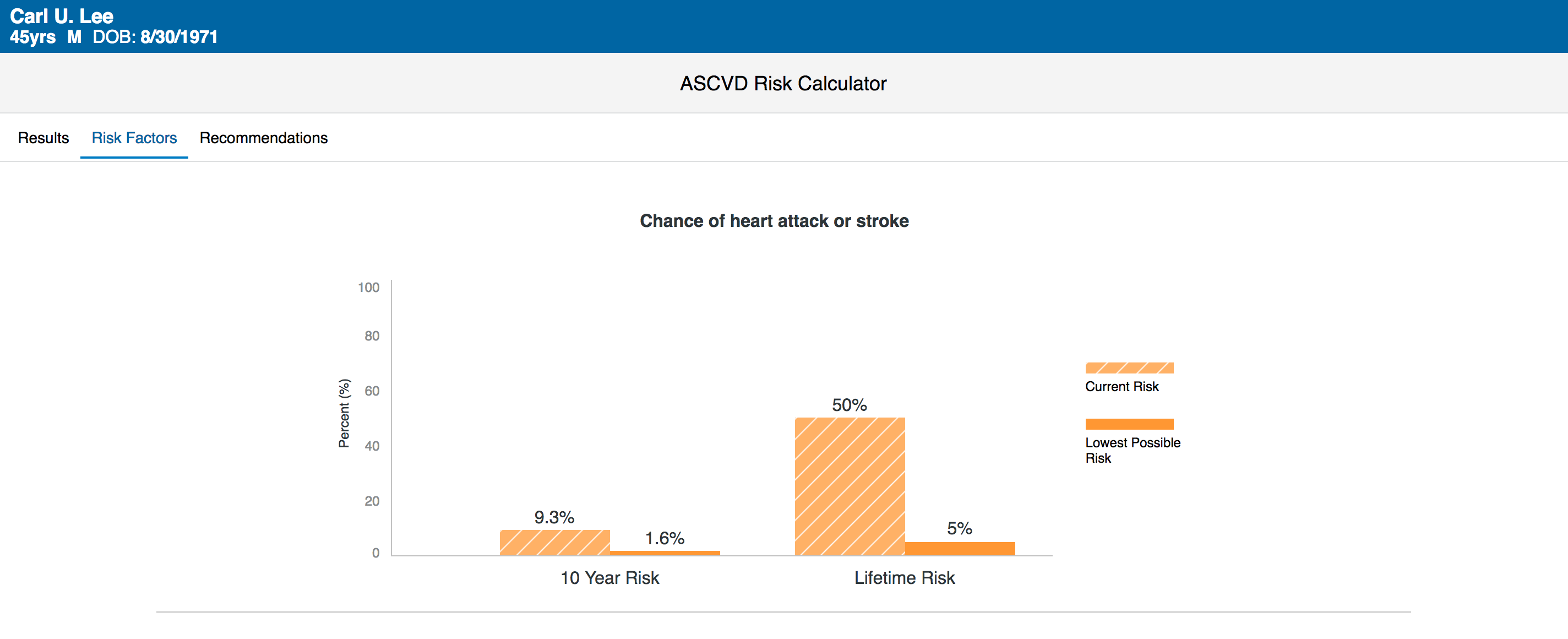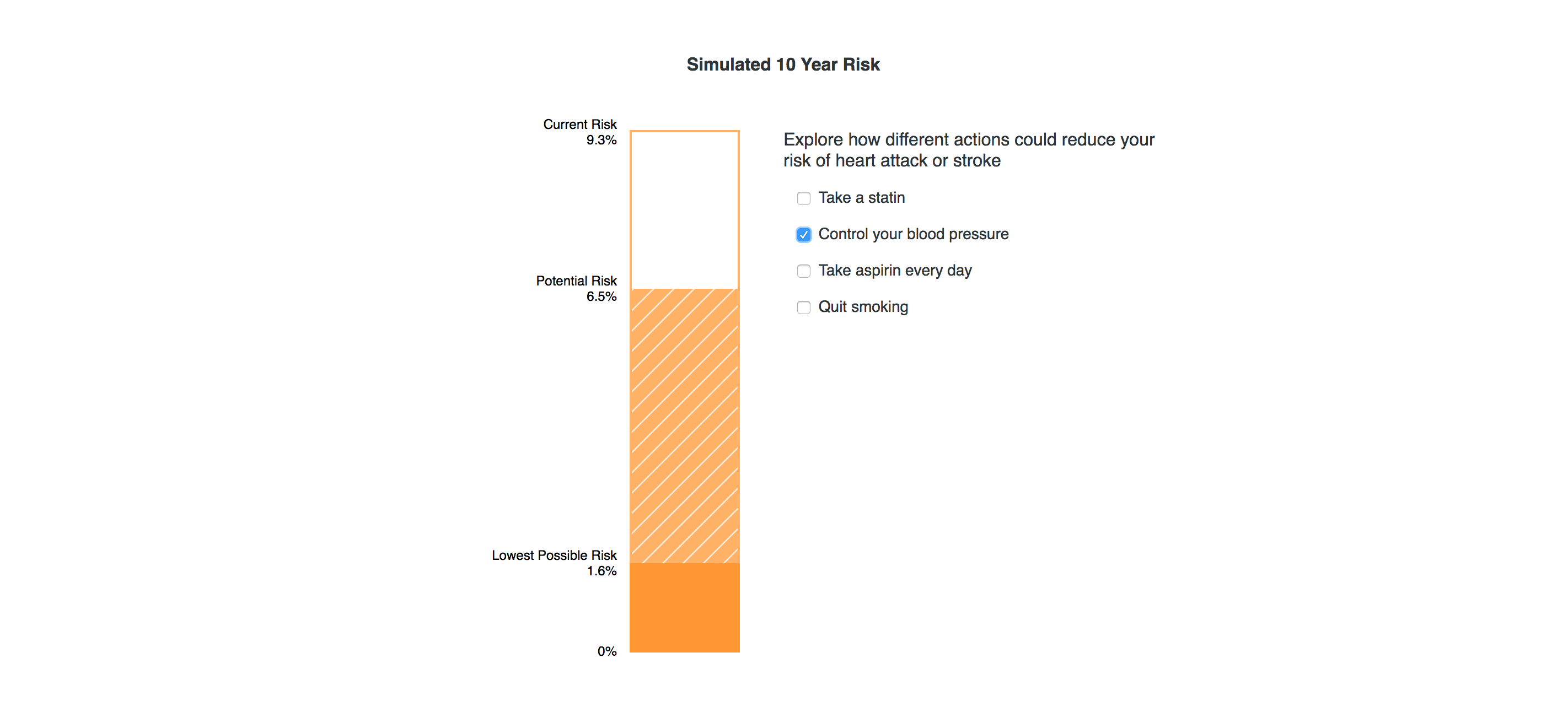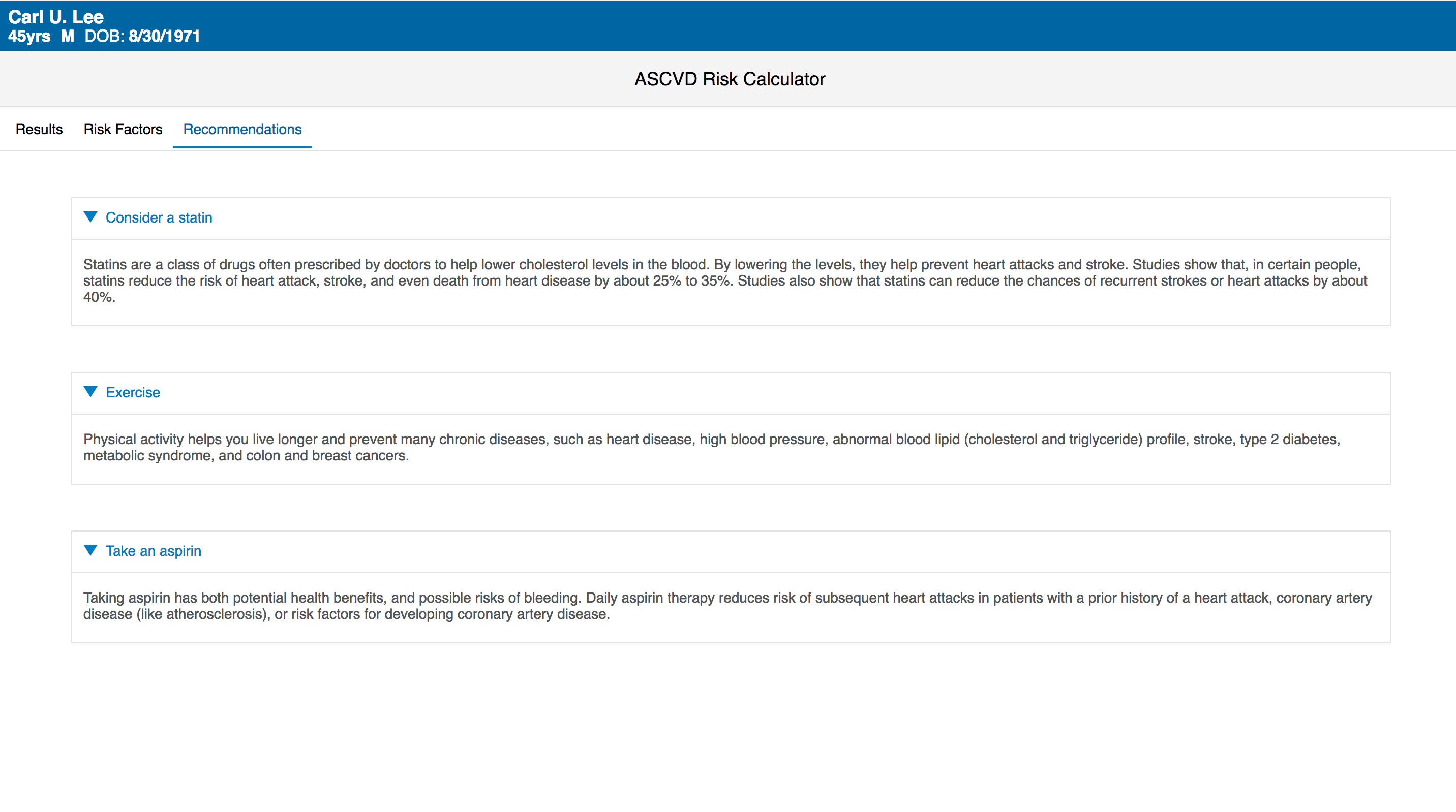ASCVD Risk App is a web application built using React, ES2015, SMART, and FHIR technologies.
The ASCVD Risk Calculator is a tool intended to help users find an estimate for their cardiovascular risk according to the 2013 ACC/AHA Guideline on the Assessment of Cardiovascular Risk and the 2013 ACC/AHA Guideline on the Treatment of Blood Cholesterol to Reduce Atherosclerotic Cardiovascular Risk in Adults. Specifically, this tool allows users to estimate a 10-year and/or lifetime risk for atherosclerotic cardiovascular disease (ASCVD). These scores are estimated based on the Pooled Cohort Equations and lifetime risk prediction tools.
The tool also has the ability to simulate a potential reduction in risk based on the risk factors taken into account to calculate the score. This allows a user to see how one or several actions could help to reduce their risk of ASCVD. Along with this, the tool calculates a lowest possible risk score determined by lowest possible values for the labs taken into account to calculate risk, and considering the user is not currently a diabetic, is not smoking, and is not taking treatment for hypertension.
This tool is intended for those with an assumed LDL - Cholesterol < 190 mg/dL, and the following are a number of factors required to calculate an estimated ASCVD risk:
- Sex
- Age
- Race
- Total Cholesterol
- HDL - Cholesterol
- Systolic Blood Pressure
- Diabetes status
- Current Smoking status
- Treatment for Hypertension status
The risk scores calculated by this tool and any recommendations provided are intended to inform, and should not supersede any findings or opinions by a care provider.
The 10-year risk estimate provided by this application is primarily applicable towards African-American and non-Hispanic white men and women between the ages of 40 and 79 years. Other ethnic groups will have their score calculated with the same equation for non-Hispanic white men and women, though the score estimated may underestimate or overestimate the risk for these persons.
The lifetime risk estimate provided by this application is primarily applicable towards non-Hispanic white men and women between the ages of 20 and 59 years. The score calculated will be under the impression of a 50-year old without ASCVD with the relevant factors entered in this calculator by the user. Similar to the 10-year risk estimate, other ethnic groups will have their score calculated with the same equation for non-Hispanic white men and women, though the score estimated may underestimate or overestimate the risk for these persons.
This project uses the webpack-dev-server to run the application locally.
In order to test reflected changes from editing any code locally off the app, components,
or views folders, there are a few steps to configure the project:
- Install NPM and install/update Node
- Run
npm installto install all dependencies onto the project - Run
npm startto start the server on port 8080 of localhost - Using a patient from the smarthealthit open FHIR DSTU2 endpoint,
launch with this link:
localhost:8080/launch.html?fhirServiceUrl=https%3A%2F%2Ffhir-open-api-dstu2.smarthealthit.org&patientId=1768562
This project uses webpack to build the application and will generate a bundle.js and styles.css file
inside the build/ directory that includes the necessary dependencies and core application code.
To create the build files, run the command: npm run build in the
root directory of this project. These files are referenced in the HTML file index.html. The build/ folder in the
project acts as the final version of these files to be used in production.
The following tree closely aligns with Hierarchy of the React Components.
Entry
|--ErrorContainer
`--App
|--Header
|--Navbar
|--PatientBanner
|--Recommendations
| `--DetailBox
|--Form
| |--ButtonForm
| |--InputTextForm
| |--RadioButtonForm
| `--SendForm
`--Results
|--Graph
| `--GraphBar
`--SimulatedRisk
`--RiskAction
When making changes locally, first make changes at the component level located in components/ and views/
or the ASCVDRisk model located at app/load_fhir_data.js. The three main views of this project are:
- Results: Form page (initial view)
- Risk Factors: Graph and Simulated Risk sections
- Recommendations: Detailed recommendation boxes
The central state of the React application is in the /components/App/app.jsx file. This
also includes handling navigation throughout the application.
When changes are verified locally, run the build (see Build section above) to bundle all changes made.
This project uses the Jest testing framework for unit testing React components, and the
Mocha testing framework for unit testing the ASCVDRisk object model. Tests are available
under the tests/ folder in the root of the project directory.
Run the following command to run all unit tests: npm test
This project uses the ESLint tool to lint all application-facing ES6 Javascript and JSX files using
the Airbnb JavaScript Style Guide. The configuration for this tool is found in the root of
the project directory in the .eslintrc file.
Run the following command to lint the project: npm run lint
Please browse our existing issues before logging new issues
See CONTRIBUTING.md
Copyright 2017 Cerner Innovation, Inc.
Licensed under the Apache License, Version 2.0 (the "License"); you may not use this file except in compliance with the License. You may obtain a copy of the License at http://www.apache.org/licenses/LICENSE-2.0 Unless required by applicable law or agreed to in writing, software distributed under the License is distributed on an "AS IS" BASIS, WITHOUT WARRANTIES OR CONDITIONS OF ANY KIND, either express or implied. See the License for the specific language governing permissions and limitations under the License.



